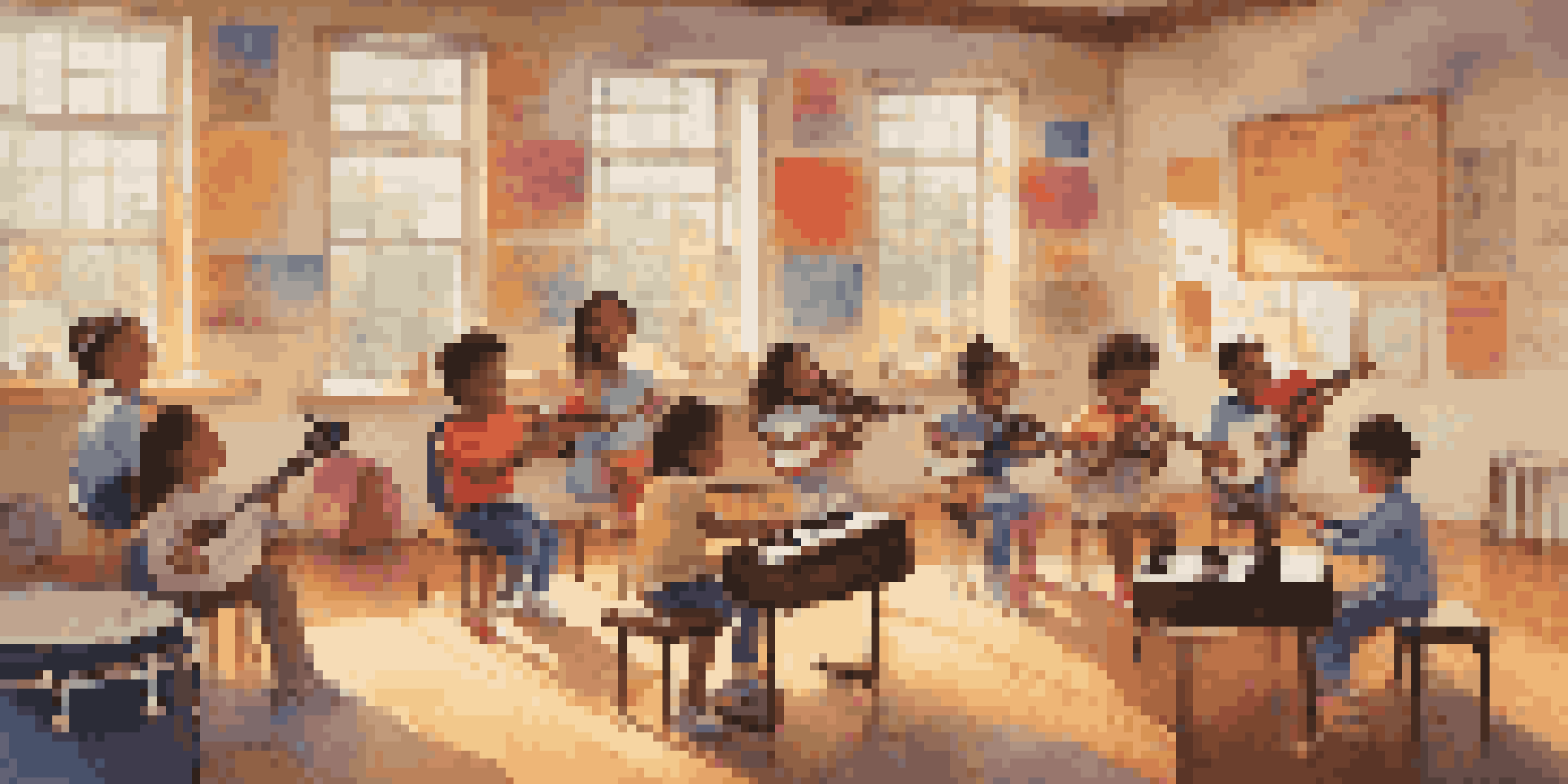How Music Education Supports Emotional Literacy in Kids

Understanding Emotional Literacy and Its Importance
Emotional literacy refers to the ability to recognize, understand, and express emotions effectively. It’s not just about feeling; it's about navigating those feelings with finesse. Kids with strong emotional literacy can manage their emotions better, leading to healthier relationships and improved mental health.
Music is the shorthand of emotion.
In a world where we often emphasize academic skills, emotional literacy is sometimes overlooked. Yet, it plays a vital role in children's overall development. By learning to articulate their feelings, children can foster deeper connections with their peers, teachers, and family.
Music education provides a unique avenue for enhancing emotional literacy. Through music, children learn to identify different emotions, both in themselves and others, creating a pathway to empathy and emotional understanding.
How Music Connects with Emotions
Music has a powerful ability to evoke emotions, often even before words can communicate them. A simple melody can bring forth joy, while a somber tune may evoke sadness. This intrinsic connection between music and emotion allows children to explore feelings in a safe environment.

When children engage with music, whether by playing an instrument or singing, they are actively experiencing emotions in a tangible way. This can lead to discussions about how certain songs make them feel or what emotions they associate with different rhythms and melodies.
Emotional Literacy Enhances Growth
Emotional literacy is crucial for children's development, helping them build healthier relationships and improve mental health.
By understanding their emotional responses to music, children can begin to articulate their feelings more clearly. This not only aids in emotional expression but also encourages them to connect those feelings to their personal experiences.
The Role of Music Education in Social Skills Development
Music education often involves collaborative activities, such as participating in a band or singing in a choir. These group settings encourage children to work together, listen actively, and communicate effectively. Such teamwork fosters essential social skills that are critical for emotional literacy.
Emotional intelligence begins with self-awareness and self-regulation, which can be nurtured through creative outlets like music.
As children navigate group dynamics in music, they learn to interpret social cues and respond to the emotions of their peers. This practice can enhance their ability to empathize, as they become more attuned to the feelings and reactions of others within the musical context.
Moreover, the encouragement and feedback received in musical environments help children build confidence in expressing their emotions. When they feel supported by their peers, they become more comfortable sharing their thoughts and feelings openly.
Identifying Emotions Through Musical Expression
In music education, children often experiment with different sounds and styles, which can be an avenue for them to express their own emotions. For instance, a child might choose a lively tempo to reflect happiness or a slow ballad to convey sadness. This exploration allows them to connect their feelings with creative expression.
When kids compose or perform music, they learn to channel their emotions into a form that others can experience. This not only validates their feelings but also helps them understand that it’s okay to express a range of emotions through art.
Music Fosters Emotional Expression
Engaging with music allows children to explore and articulate their emotions, promoting understanding and connection.
Such experiences can be pivotal for children as they learn to recognize that their emotions are valid and worthy of expression. This understanding can lead to healthier emotional processing and resilience over time.
Music as a Tool for Emotional Regulation
Music can serve as an effective tool for emotional regulation, helping children manage stress, anxiety, and other challenging emotions. A calming piece of music can soothe a child’s nerves, while an upbeat song can energize them when they feel down. This knowledge empowers kids to use music as a coping strategy.
By introducing children to various musical genres and styles, educators can guide them to find the right type of music that resonates with their emotional state. This personalized approach can help them learn how to self-soothe and regain emotional balance.
Furthermore, the act of creating music can also be therapeutic. Engaging in musical activities allows children to express their feelings constructively, reducing impulsive emotional reactions and promoting emotional resilience.
Encouraging Emotional Conversations Through Music
Music education creates opportunities for meaningful conversations about feelings and emotions. Teachers can use songs as a springboard for discussions, asking students how a particular piece makes them feel or what story they think the music is telling. This encourages thoughtful reflection on emotions.
These discussions not only help children articulate their own feelings but also promote listening skills and empathy. When they hear their peers share emotional experiences related to music, they learn to appreciate different perspectives and emotional narratives.
Collaboration in Music Builds Skills
Music education encourages teamwork and social skills, essential for interpreting emotions and empathizing with others.
By validating each other's feelings in a safe space, children can develop deeper emotional intelligence. This practice helps them understand that everyone experiences emotions differently, fostering a culture of acceptance and support.
Music Education: A Holistic Approach to Development
Integrating music education into a child's learning experience offers a holistic approach to their development. It nurtures cognitive skills, social abilities, and emotional understanding, creating well-rounded individuals. When children engage with music, they are not just learning notes and rhythms; they are also learning about themselves and others.
This comprehensive development is crucial in today’s fast-paced world, where emotional literacy is more important than ever. Children equipped with emotional skills through music education are better prepared to handle life's challenges and build meaningful relationships.

In essence, music education contributes to creating emotionally literate future citizens. By fostering these skills early on, we set the stage for a generation that values emotional expression and understands the significance of empathy.